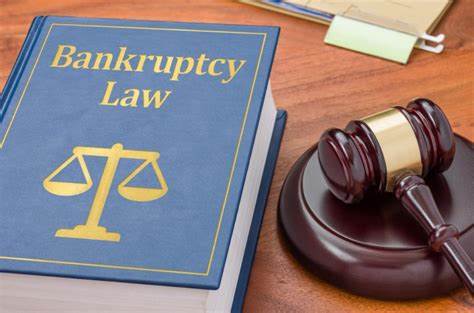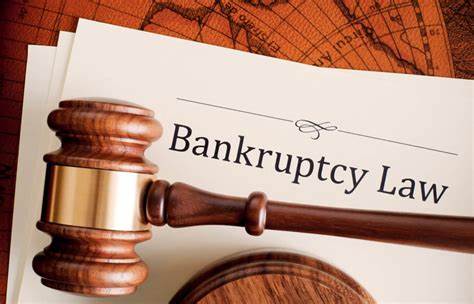Navigating through bankruptcy can be a daunting and overwhelming experience. When faced with financial hardships, it’s essential to seek expert advice to help you start fresh. In Schaumburg, understanding bankruptcy law in Schaumburg is crucial.
At [Brand Name], we specialize in providing expert guidance on bankruptcy law in Schaumburg. Our team of experienced professionals has a deep understanding of the legal processes and can offer personalized solutions to meet your specific needs.
Whether you’re an individual struggling with overwhelming debt or a business owner facing financial challenges, we are here to help. Our extensive knowledge of bankruptcy law in Schaumburg enables us to provide expert advice, helping you make informed decisions and pave the way to a brighter financial future.
Our compassionate approach ensures that you receive the support and guidance you need during this difficult time. We will work closely with you to assess your financial situation, explore available options, and guide you through the intricacies of bankruptcy law in Schaumburg.
Don’t let bankruptcy overwhelm you. Contact [Brand Name] today and take the first step towards a fresh start.
Types of Bankruptcy in Schaumburg
When it comes to bankruptcy in Schaumburg, there are different types available depending on your specific circumstances. Understanding these types is crucial to determine which one is most suitable for your situation.
Chapter 7 bankruptcy, also known as liquidation bankruptcy, is the most common type. It involves the liquidation of non-exempt assets to pay off creditors. This type of bankruptcy is typically for individuals who have little to no disposable income and a significant amount of unsecured debt.
Chapter 13 bankruptcy, on the other hand, is known as reorganization bankruptcy. This allows individuals with a regular income to develop a repayment plan to pay off their debts over a period of three to five years. This type of bankruptcy is often chosen by those who have a steady income but are struggling to meet their financial obligations.
Chapter 11 bankruptcy is primarily designed for businesses and allows them to reorganize their debts while continuing their operations. This type of bankruptcy provides an opportunity for businesses to regain financial stability and avoid liquidation.
Understanding the different types of bankruptcy law inverness is crucial as it will determine the process you need to follow and the potential outcomes. Consulting with a bankruptcy attorney in Schaumburg is highly recommended to ensure you make the right choice for your specific circumstances.
Understanding the Bankruptcy Process
The bankruptcy process can be complex, but having a clear understanding of each step involved can help alleviate some of the stress and uncertainty. Here’s a breakdown of the bankruptcy process in Schaumburg:
- Pre-filing requirements: Before filing for bankruptcy, you’ll need to complete credit counseling from an approved agency within 180 days. This counseling session aims to help you explore alternatives to bankruptcy and assess your financial situation thoroughly.
- Filing the bankruptcy petition: Once you have completed the necessary pre-filing requirements, your bankruptcy attorney will assist you in preparing and filing the bankruptcy petition. This document includes detailed information about your financial situation, assets, liabilities, and income.
- Automatic stay: Once your bankruptcy petition is filed, an automatic stay is put into effect. This means that creditors must immediately stop all collection efforts, including phone calls, letters, and lawsuits. The automatic stay provides immediate relief, giving you the opportunity to regroup and focus on your bankruptcy proceedings.
- Meeting of creditors: Approximately 30 to 45 days after filing your bankruptcy petition, a meeting of creditors, also known as a 341 meeting, will be scheduled. During this meeting, you’ll be required to answer questions under oath about your financial affairs. Your bankruptcy attorney will be present to guide you through the process and ensure your rights are protected.
- Repayment or liquidation: Depending on the type of bankruptcy you file, you’ll either enter a repayment plan or undergo liquidation of assets. In Chapter 7 bankruptcy, non-exempt assets are liquidated to pay off creditors. In Chapter 13 bankruptcy, a repayment plan is developed based on your income and expenses.
- Discharge: Once you have completed all the necessary requirements, including the repayment plan or liquidation process, you will receive a discharge. This means that your debts are legally forgiven, and you are no longer obligated to repay them.
Understanding the bankruptcy process is essential to ensure you follow the correct steps and meet all the necessary requirements. Hiring a bankruptcy attorney in Schaumburg is highly recommended to guide you through the process and ensure a successful outcome.
Hiring a Bankruptcy Attorney in Schaumburg
When facing bankruptcy in Schaumburg, hiring a bankruptcy attorney is crucial to ensure that you receive expert guidance throughout the process. A bankruptcy attorney specializes in bankruptcy law and has the knowledge and experience to navigate the legal complexities involved.
One of the main benefits of hiring a bankruptcy attorney is their ability to assess your financial situation and determine the best course of action. They will thoroughly review your assets, debts, income, and expenses to determine your eligibility for bankruptcy and advise you on the most suitable type of bankruptcy to file.
Additionally, a bankruptcy attorney will handle all the necessary paperwork and documentation required for filing bankruptcy. They will ensure that all the information provided is accurate and complete to avoid any potential complications or delays in the process.
Furthermore, a bankruptcy attorney will represent you in court, attend the meeting of creditors, and negotiate with creditors on your behalf. They will protect your rights and ensure that your best interests are represented throughout the bankruptcy proceedings.
Choosing the right bankruptcy attorney in Schaumburg is essential for a successful outcome. Look for attorneys with experience in bankruptcy law, a proven track record of success, and positive client testimonials. Schedule consultations with multiple attorneys to find the one that you feel most comfortable working with and who understands your specific needs.
Determining Eligibility for Bankruptcy
Determining eligibility for bankruptcy in Schaumburg is an important step in the process. To file for bankruptcy, you must meet certain criteria and satisfy specific requirements. Here are some key factors that determine eligibility:
- Means test: The means test is a calculation that compares your income to the median income in your state for a household of the same size. If your income is below the median, you pass the means test and are eligible to file for Chapter 7 bankruptcy. If your income is above the median, further calculations are required to determine if you still qualify.
- Financial distress: To be eligible for bankruptcy, you must be facing genuine financial distress. This can include overwhelming debt, loss of income, medical expenses, or other circumstances that prevent you from meeting your financial obligations.
- Previous bankruptcy filings: Depending on your previous bankruptcy filings, there may be limitations on when you can file for bankruptcy again. These limitations vary depending on the type of bankruptcy previously filed and the time that has passed since the last filing.
- Credit counseling: As mentioned earlier, completing credit counseling from an approved agency is a requirement before filing for bankruptcy. This counseling session aims to assist you in exploring alternatives to bankruptcy and determining if bankruptcy is the right solution for your financial situation.
It’s important to consult with a bankruptcy attorney to determine your eligibility for bankruptcy accurately. They will assess your financial situation, review your income and expenses, and guide you through the eligibility requirements to ensure you make an informed decision.
Steps to Take Before Filing for Bankruptcy
Before filing for bankruptcy in Schaumburg, there are several steps you should take to ensure you are prepared and make the process as smooth as possible. Here are some important steps to consider:
- Assess your financial situation: Take a thorough look at your finances, including your assets, debts, income, and expenses. Understanding your financial situation will help you determine if bankruptcy is the right solution for you and which type of bankruptcy to pursue.
- Explore alternatives: Bankruptcy should be considered as a last resort. Before filing, explore alternative options such as debt consolidation, debt negotiation, or credit counseling. These alternatives may provide a viable solution to your financial difficulties without the need for bankruptcy.
- Gather documentation: Start gathering all the necessary documentation required for filing bankruptcy. This includes recent tax returns, bank statements, pay stubs, and any other financial records that will support your bankruptcy petition.
- Consult with a bankruptcy attorney: Schedule a consultation with a bankruptcy attorney in Schaumburg. They will provide expert advice based on your specific circumstances and guide you through the process. A bankruptcy attorney will ensure that all necessary steps are taken and that your rights are protected throughout the bankruptcy proceedings.
- Follow the advice of your attorney: Once you have hired a bankruptcy attorney, it’s important to follow their advice and guidance. They have the knowledge and experience to navigate the bankruptcy process and will provide personalized solutions to meet your specific needs.
By taking these steps before filing for bankruptcy law in Schaumburg, you can ensure that you are well-prepared and make informed decisions throughout the process. A bankruptcy attorney will play a crucial role in guiding you through these steps and ensuring a successful outcome.
Filing for Bankruptcy in Schaumburg
When it comes to filing for bankruptcy law in Schaumburg, it’s essential to follow the correct procedures and meet all the necessary requirements. Filing for bankruptcy involves several steps, and having expert guidance is crucial for a successful outcome.
- Complete the necessary paperwork: Your bankruptcy attorney will assist you in completing the necessary paperwork for filing bankruptcy. This includes preparing the bankruptcy petition, schedules, and supporting documentation. It’s crucial to provide accurate and complete information to avoid potential complications or delays.
- File the bankruptcy petition: Once all the paperwork is complete, your bankruptcy attorney will file the bankruptcy petition on your behalf. The petition is filed with the bankruptcy court, and a filing fee is required. Your attorney will ensure that all the necessary documents are submitted correctly and within the required timeframes.
- Automatic stay: Once your bankruptcy petition is filed, an automatic stay is put into effect. This means that creditors must immediately stop all collection efforts, including phone calls, letters, and lawsuits. The automatic stay provides immediate relief, giving you the opportunity to regroup and focus on your bankruptcy proceedings.
- Meeting of creditors: A meeting of creditors, also known as a 341 meeting, will be scheduled approximately 30 to 45 days after filing your bankruptcy petition. During this meeting, you’ll be required to answer questions under oath about your financial affairs. Your bankruptcy attorney will be present to guide you through the process and ensure your rights are protected.
- Repayment or liquidation: Depending on the type of bankruptcy you file, you’ll either enter a repayment plan or undergo liquidation of assets. In Chapter 7 bankruptcy, non-exempt assets are liquidated to pay off creditors. In Chapter 13 bankruptcy, a repayment plan is developed based on your income and expenses.
- Discharge: Once you have completed all the necessary requirements, including the repayment plan or liquidation process, you will receive a discharge. This means that your debts are legally forgiven, and you are no longer obligated to repay them.
Filing for bankruptcy is a complex legal process, and having a bankruptcy attorney by your side is crucial. They will ensure that all the necessary steps are followed, the correct paperwork is completed, and your rights are protected throughout the proceedings.
Bankruptcy law in Schaumburg can be overwhelming, but with the help of expert guidance, you can start fresh and pave the way to a brighter financial future. At [Brand Name], our team of experienced professionals is dedicated to providing personalized solutions to meet your specific needs. Contact us today and take the first step towards a fresh start.






